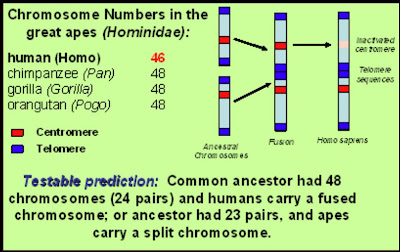
The above link shows the irreppresible Ken Miller in action. I want to mention that up-front, because I am deeply indebted to Dr. Miller on a number of levels. A celebrated advocate for evolution who testified for the plaintiffs in the Dover trial, he is also the author of one of the widely-used high-school textbooks in North America, Prentice-Hall Biology. Dr. Miller has graciously allowed me to use his work on more than one occasion, including in the preparation of this post. Details and acknowledgments below.*
In the previous post, I claimed that I was going to present a clear example of an independent test of morphological change being the result of evolution, and the sort of change that clearly supports an inference of common descent between two different species. The example I’ve chosen, the alleged descent with modification of modern chimpanzees and humans from a common ancestor, is just such an example. Because of their prior commitments, almost all creationists are going to feel compelled to admit that this case, if true, is a demonstration of ‘macroevolution.’ I can’t imagine any creationist who wouldn’t admit that the gap between chimps and ourselves is anything other than a la
So this is a good way to test the 'slippery slope' of 'macroevolution', since when you try to pin some creationists down, they'll admit some changes occurs, even speciation events----but they'll shift the playing field, saying that your example, whatever it was, is not really 'macroevolution' but simply variation within the kind. Even better, this example allows us to address the claim that evolutionary theory is not predictive in a very specific way!
But I'll let Dr. Miller summarize the case. He certainly explains it far better than I ever could:
"As most of you know, there is substantial evidence that our species shares a common ancestor with the great apes –– the gorilla, orangutan and chimpanzee. But can we be sure of this? Can we put that evidence to the test? Today, we can indeed. The complete DNA sequence of one of those great apes, the chimpanzee, was published less than a week ago, and it provides us with a remarkable new opportunity to answer a question that has fascinated people of every culture, of every place and time. Where did we come from?
We human beings carry our genetic information on 23 pairs of DNA-containing chromosomes. The great ape species, on the other hand, have 24 pairs. And there’s the mystery. How could we share a common ancestor with them if you and I and even President Simmons 
Well, if one thought that our genome was "designed," as many Americans seem to, it wouldn’t have gone anywhere. If our DNA was the unique product of an intelligent designer, that fellow could simply have arranged our DNA in fewer packages than the apes, and since there is no real relationship between us and them, nothing would be missing.
But if a fellow named Charles Darwin was right, there is a relationship, a link, and the remnants of that missing chromosome have to be somewhere inside us. You couldn’t just throw a whole chromosome away, and therefore evolution makes a testable prediction. When we lay the human and chimpanzee genomes side by side, we’ve got to find a human chromosome constructed by sticking two chromosomes together from that common ancestor. And if we cannot find it, evolution is wrong. Well, guess what? It’’s chromosome #2.
Our second chromosome was produced by the head to head fusion of ape chromosomes 12 and 13, and the new primate and human data show the exact point at which those two chromosomes were pasted together. No doubt about it –– like a criminal at the scene of a crime, evolution left its messy fingerprints all over us –– and we know where we came from. Like everything else on this planet, we evolved.
Whether you find that conclusion depressing or exhilarating, it changes the way we see our world, our existence, and our relationship to every other living thing that inhabits this planet. It’s practical knowledge, to be sure, but like all true knowledge, it has the power to change, enlighten, and transform."
I can't add much more than that, other than a caution. This example powerfully demonstrates macroevolution, and that the application of TENS to a particular problem (such as the question of our relationship to other primates) yields testable predictions. There is a plausible series of natural events which can account for the genetic and morphological differences between human beings. What it does not demonstrate, however, is that in this particular case all of the evolution we see is entirely due to natural selection alone. But (and this bears repeating) contemporary biology makes no such claim, and those who say that we do are putting forth a 'straw man' to justify their skepticism of evolutionary theory in general. If things were as such critics claim, then the textbooks would not include things like genetic drift or endosymbiosis.
Now, I think this observation has some bearing on some issues that Vox has raised in the past few posts as to how some 'evolutionists' have enlisted Darwin to 'attack religious faith', ridicule politicians who fail to say they 'believe in evolution', or attempt to suppress skepticism about TENS as unscientific. I will try to address these in a future post. For now, I will simply tackle his most recent question for me: "...if many other complex models which backtested better than TENS have proven to be roundly unsuccessful when their future predictions have been subjected to rigorous scientific experimentation, what is the basis of your apparent belief that TENS-based models will prove more successful?" I'm not sure this is a meaningful question for me, for two reasons: first, because I don't have a commitment one way or the other against any future model; second, because it's the wrong way to conceptualize the matter, that things will either be TENS-based or not. Here's what I would say: evolution and natural selection are both facts, and in particular cases a relationship between these two facts has been demonstrated, while in general cases it is inferred on the basis of multiple lines of evidence. Any future alternative to the present model will have to account for all the facts currently in our possession, and among those facts are evolution, and natural selection. * The video is an excerpt from a presentation that Dr. Miller gave at Case Western University in February of 2006, less than two months after Judge John Jones III ruled against the Dover school board. It's highly similar to a talk that I saw Dr. Miller give a few months later in Modesto, California. The illustrations in this post are adapted, with Dr. Miller's permission, from the Power Point that he used in both talks, a copy of which is available here both as a presentation and a PDF file from the AAAS. Dr. Miller has also consented to my sharing excerpts from his commencement address to Brown University students in September 2005, which summarizes the findings under discussion in a concise and user-friendly fashion. ** It should not be inferred that the latter is Vox’s position, or that he will either endorse or reject this particular example. I am very much interested, though, in his response.






